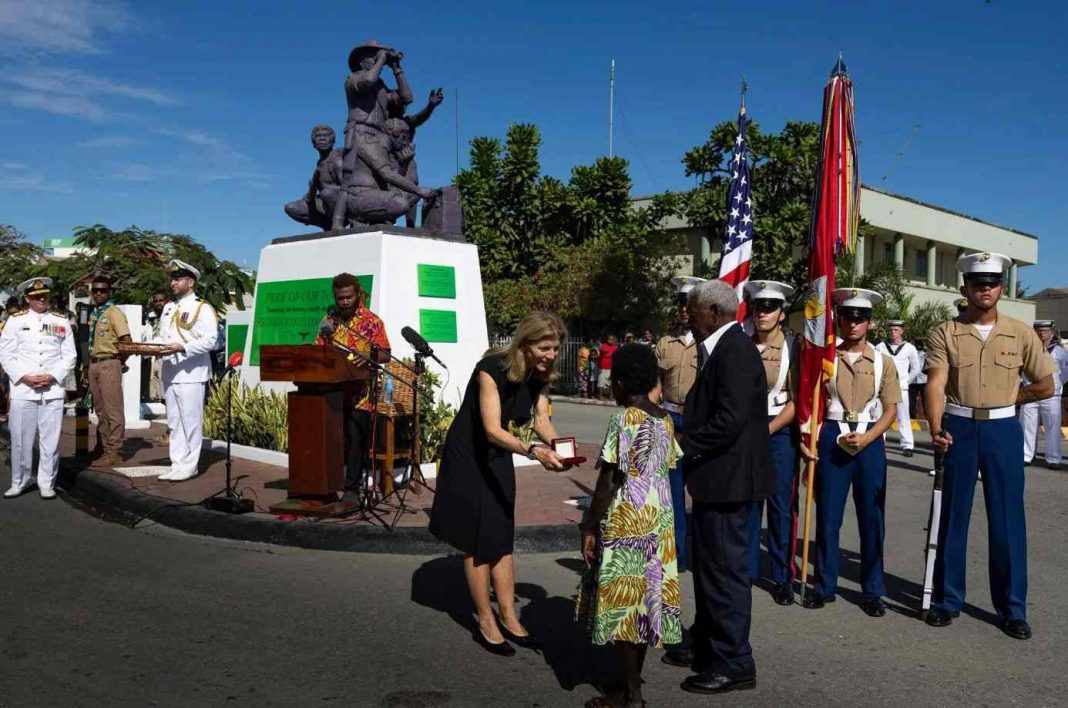Caroline Kennedy, the United States ambassador to Australia, and Wendy Sherman, the United States deputy secretary of state, stood together on the island of Guadalcanal at dawn on Sunday to commemorate the 80th anniversary of the World War II battle that took place there. Both of their fathers were involved in the conflict, which nearly resulted in their deaths and reshaped America’s role in Asia.
Violence, competitiveness among major powers, and restless anxiety about the future were all present back then, as they are today. Their visit took place at the same time as China’s military was scheduled to finish a simulation of an invasion lasting for three days all around Taiwan. Both leaders stressed in their speeches at gatherings with officials from Japan, Australia, New Zealand, and the Solomon Islands that the region as well as the globe finds itself at another crossroad
Ms. Sherman’s comments were far more direct. She addressed a gathering that had assembled on a verdant hill high above the capital city of the Solomon Islands, Honiara, and told them, “It is up to us to decide whether we want to continue having societies where people are free to voice their thoughts.” “If we want to have governments that are open to the public and responsible to the people they serve, then. If we want an international system that is just and well-organized, in which everyone participates according to the same set of rules, and in which disagreements are resolved amicably, then.”
The trips to Asia were followed by the visit to Guadalcanal, which was the bookend to a tense week. As is typical during times of heightened rivalry between great powers, history, diplomacy, and a crisis all become entangled in one another throughout the area.
According to a recent article written by Hal Brands, a professor of global affairs at Johns Hopkins University.
The superpowers of today are different, and so are the sites where they compete, with new testing grounds appearing in places like Ukraine and Taiwan. But there are parts of the world, like the islands in the Pacific, that seem destined to play similar parts again and again.
China has been making efforts throughout the area to gain influence, resources, and perhaps military sites in what security experts see as an attempt to destabilise the presence of both the United States and Australia in the island chains that played an important part in World War II.
The government of the Solomon Islands, which is one of the least developed of the countries that are found in the Pacific, has been particularly welcoming. The Chinese government views Taiwan as a breakaway province, and in 2019, Prime Minister Manasseh Sogavare severed diplomatic relations with the self-governing island of Taiwan. A few months ago, Obama inked a security pact with Beijing that might enable China’s navy to utilise some of the same islands where over 7,000 Americans lost their lives during World War II. This arrangement was reached after he visited Beijing.
Mr. Sogavare, who had a private meeting with American officials and did not participate in Sunday’s ceremony, has reiterated that there would not be a Chinese base built in the future. Despite this, the United States of America made the announcement earlier this year that it will reopen an embassy in Honiara while also establishing embassies in Kiribati and Tonga, which are two other Pacific countries with a significant population of Chinese citizens.
Along with a formal diplomatic campaign, which Australia has also strengthened, repeated reminders of American relationships dating all the way back to the 1940s have also been brought up.
Recent conversations have taken place between Ms. Kennedy, the daughter of John F. Kennedy, and Ms. Sherman, whose father, Mal Sherman, served in the Marine Corps. Both of their families have ties to the Solomon Islands and the war.
Ms. Sherman said in an interview before to the trip that “we focused on how she wouldn’t be here, and how I wouldn’t be here,” if our dads hadn’t been saved. “We wouldn’t be here,” She went on to say that it was also abundantly evident that these anecdotes provide a chance for “energising our partners.”

